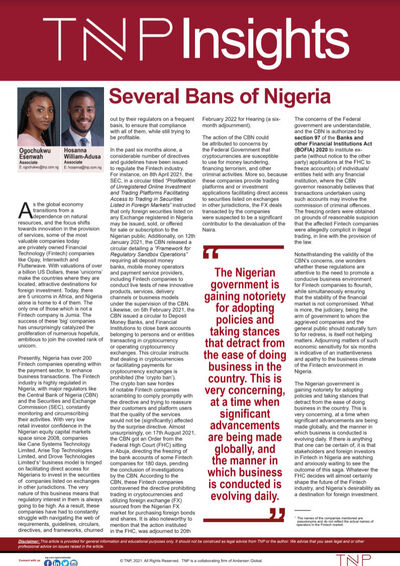As the global economy transitions from a dependence on natural resources, and the focus shifts towards innovation in the provision of services, some of the most valuable companies today are privately owned Financial Technology (Fintech) companies like Opay, Interswitch and Flutterwave. With valuations of over a billion US Dollars, these ‘unicorns’ make the countries where they are located, attractive destinations for foreign investment. Today, there are 5 unicorns in Africa, and Nigeria alone is home to 4 of them. The only one of those which is not a Fintech company is Jumia. The success of these ‘big’ companies has unsurprisingly catalyzed the proliferation of numerous hopefuls, ambitious to join the coveted rank of unicorn.
Presently, Nigeria has over 200 Fintech companies operating within the payment sector, to enhance business transactions. The Fintech industry is highly regulated in Nigeria, with major regulators like the Central Bank of Nigeria (CBN) and the Securities and Exchange Commission (SEC), constantly monitoring and circumscribing their activities. With very low retail investor confidence in the Nigerian equity capital markets space since 2008, companies like Cane Systems Technology Limited, Arise Top Technologies Limited, and Drove Technologies Limited‘s business model is hinged on facilitating direct access for
Nigerians to invest in the securities of companies listed on exchanges in other jurisdictions. The very nature of this business means that regulatory interest in them is always going to be high. As a result, these companies have had to constantly struggle with navigating the web of requirements, guidelines, circulars, directives, and frameworks, churned out by their regulators on a frequent basis, to ensure that compliance with all of them, while still trying to be profitable.
In the past six months alone, a considerable number of directives and guidelines have been issued to regulate the Fintech industry. For instance, on 8th April 2021, the SEC, in a circular titled “Proliferation of Unregistered Online Investment and Trading Platforms Facilitating Access to Trading in Securities Listed in Foreign Markets” instructed that only foreign securities listed on any Exchange registered in Nigeria may be issued, sold, or offered for sale or subscription to the Nigerian public. Additionally, on 12th January 2021, the CBN released a circular detailing a “Framework for Regulatory Sandbox Operations” requiring all deposit money banks, mobile money operators and payment service providers, including Fintech companies to conduct live tests of new innovative products, services, delivery channels or business models under the supervision of the CBN.
Likewise, on 5th February 2021, the CBN issued a circular to Deposit Money Banks, and Financial Institutions to close bank accounts belonging to persons and or entities transacting in cryptocurrency or operating cryptocurrency exchanges. This circular instructs that dealing in cryptocurrencies or facilitating payments for cryptocurrency exchanges is prohibited (the ‘crypto ban’).
The crypto ban saw hordes of notable Fintech companies scrambling to comply promptly with the directive and trying to reassure their customers and platform users that the quality of the services would not be (significantly) affected by the surprise directive. Almost unsurprisingly, on 17th August 2021, the CBN got an Order from the Federal High Court (FHC) sitting in Abuja, directing the freezing of the bank accounts of some Fintech companies for 180 days, pending the conclusion of investigations by the CBN.




